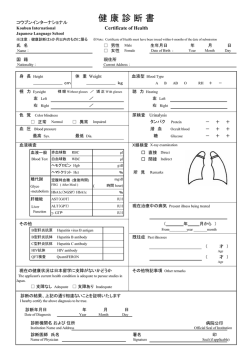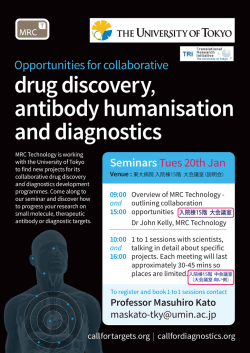
Reactivation of Epstein-Barr virus in the pathogenesis of
【要約】 Reactivation of Epstein-Barr virus in the pathogenesis of neuromyelitis optica (視神経脊髄炎の病態における Epstein-Barr ウイルス再活性化の関与) 千葉大学大学院医学薬学府 先端生命科学専攻 神経内科学 (主任:桑原聡教授) 佐久間(増田)冴子 ABSTRACT Epstein–Barr virus (EBV) infection has been thought to be a key environmental factor in the development of multiple sclerosis (MS) because higher levels of EBV antibodies, particularly those against EBV nuclear antigen-1, indicating past EBV infection, have been consistently found in patients with MS. In contrast, evidence for an association of EBV with neuromyelitis optica (NMO) has not been completely accumulated. We measured the levels of serum antibodies against EBV antigens in 50 patients with NMOs (38 with definite neuromyelitis optica and 12 with a partial form), 51 patients with MS and 52 healthy controls (HCs) and measured the levels of these antibodies in the cerebrospinal fluid (CSF) in 37 patients with NMOs and 33 patients with MS. Compared with patients with MS and HC, patients with NMOs had serum anti-early antigen (EA) IgG antibodies (52%) more frequently, indicating more active viral replication than patients with MS (26%) and HCs (25%); the antibody titres were significantly higher in patients with NMOs than in those with MS (P = 0.005) and HCs (P = 0.005). Moreover, the antibody titres in the CSF were higher in patients with NMOs than in those with MS (P = 0.03) and had a significant positive correlation with the serum antibody titres (r = 0.563; P < 0.001). These titres remained high at the time of clinical relapse and during the remission phase and had a positive correlation with serum anti-aquaporin-4 antibody titres (r = 0.397; P = 0.047). The post- mortem brain and spinal cord tissues from an EA IgG antibody-seropositive patient with neuromyelitis optica showed the expression of EBV markers, namely EBV-encoded RNA by in situ hybridization and EBV-related antigens by immunohistochemistry. Our results support the hypothesis that persistent, active EBV replication is frequently found in NMO and may contribute to the immunological alternations that play a pathogenetic role in the disorder. Brain 平成 25 年 12 月 投稿中
© Copyright 2026

